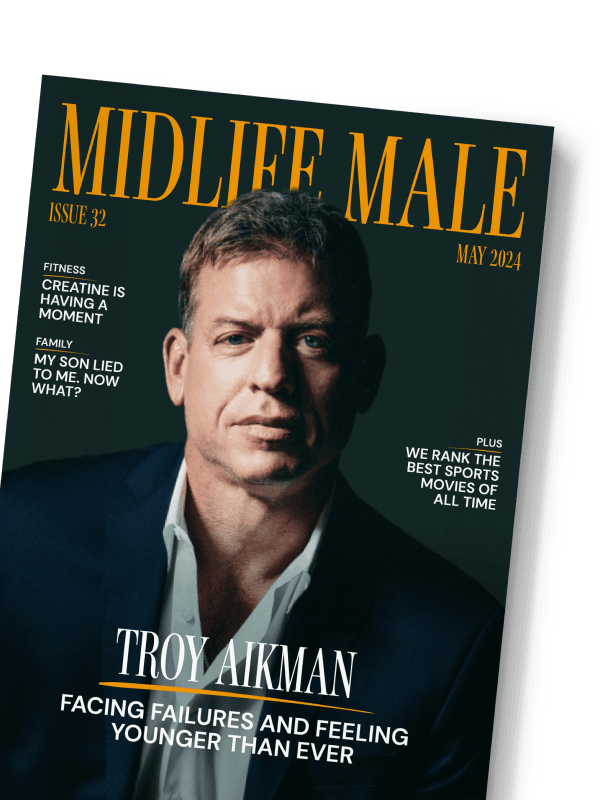Meet John, a successful executive juggling back-to-back meetings, family responsibilities, and mounting deadlines. His mind races constantly, sleep becomes elusive, and the pressure feels overwhelming.
Many men share John’s experience, silently carrying the weight of modern life’s demands while society expects them to “tough it out.” Yet mindfulness can significantly reduce stress and anxiety in men, improving both mental and physical health.
The stigma around mental wellness practices for men continues to fade as more leaders and athletes embrace mindfulness techniques. These evidence-based practices provide practical tools for managing stress, enhancing focus, and building emotional resilience while maintaining strength and masculinity.
Whether you’re dealing with workplace pressure, relationship challenges, or personal growth goals, mindfulness offers a powerful framework for maintaining balance and clarity. Consider it mental strength training – just as you build physical strength at the gym, mindfulness develops mental fortitude.
This guide presents actionable mindfulness techniques specifically tailored for men’s lifestyles and needs. No incense or meditation cushions required – just practical strategies you can implement anywhere, from the office to the gym, to enhance performance and well-being in all areas of life.
Breaking Down Barriers: Addressing Common Misconceptions

Let’s tackle the elephant in the room – the outdated notion that mindfulness practices are somehow ‘soft’ or ‘feminine.’ This misconception couldn’t be further from the truth. Mindfulness is fundamentally about developing mental toughness and emotional intelligence – qualities that align perfectly with traditionally masculine values of strength and self-reliance.
Many successful male leaders and athletes have discovered that mindfulness isn’t about becoming a blank slate or escaping reality. Instead, it serves as an active training ground for developing sharper focus, better decision-making abilities, and enhanced emotional control – skills that prove invaluable in both personal and professional spheres.
Another common barrier is the belief that mindfulness requires hours of sitting cross-legged in silence. The truth is, mindfulness can be practiced during everyday activities, from your morning workout to your commute. It emphasizes engagement over escape, presence over passivity.
Building Mental Toughness Through Mindfulness
Mindfulness strengthens mental resilience by training your mind to stay focused under pressure. Consider it a mental workout that builds psychological stamina, much like physical training builds bodily strength.
According to research showcased on Wellness Guide, mindfulness practices help men process emotions in a healthier manner while maintaining their strength and stoicism when needed. It’s about expanding your capabilities, not changing who you are.
The practice develops what psychologists call ’emotional intelligence’ – the ability to recognize, understand, and manage emotions effectively. This skill proves invaluable in leadership roles, high-pressure situations, and personal relationships.
Enhancing Performance and Self-Reliance
Far from being a passive activity, mindfulness sharpens your competitive edge. Elite athletes and business leaders use these techniques to maintain focus, manage stress, and make better decisions under pressure.
The practice reinforces self-reliance by teaching you to regulate your own emotional state rather than being at the mercy of external circumstances. This emotional self-sufficiency stands as a cornerstone of traditional masculine values.
Think of mindfulness as a tool in your mental toolkit – like strategic thinking or problem-solving. It’s not about replacing traditional masculine strengths, but rather enhancing them with greater awareness and control.
Quick and Effective Mindfulness Techniques for Busy Men
Men often struggle to find time for mental wellness amid career demands, family responsibilities, and personal commitments. Research confirms that even brief mindfulness practices can significantly reduce stress and improve focus.
As someone who’s worked with numerous male professionals, I’ve seen firsthand how simple mindfulness techniques can transform daily routines without requiring major lifestyle changes. Let’s explore practical exercises that seamlessly fit into a busy man’s schedule.
Mindful Breathing for Instant Calm
The foundation of mindfulness begins with breath awareness – a powerful tool you can use anywhere, anytime. Research shows that focused breathing for just a few minutes can lower stress and boost mental clarity.
Start by finding a comfortable seated position, whether at your desk or during your commute. Close your eyes and take three deep breaths, feeling the rise and fall of your chest. Notice the temperature of the air as it enters and exits your nostrils.
When thoughts arise about pending deadlines or upcoming meetings, gently redirect your focus back to your breath. This simple practice helps break the cycle of stress and racing thoughts that many men experience throughout the day.
Body Scan Meditation for Physical Awareness
Many men carry tension without realizing it, particularly in their shoulders, neck, and jaw. A quick body scan can release this physical stress and improve mind-body connection. Consider it a mental check-engine light for your body.
Begin at the top of your head and systematically move your attention downward through each part of your body. Notice any areas of tightness or discomfort without trying to change them. This awareness alone often triggers natural relaxation.
You can perform this technique during natural breaks in your day – while waiting for a meeting to start, sitting in traffic, or during your morning shower. The key is consistency rather than duration.
Mindful Physical Activities
For men who prefer action to sitting still, mindful movement offers a perfect blend of physical and mental benefits. Studies indicate that combining mindfulness with exercise can significantly enhance stress relief and mental clarity.
During your regular workout, focus intently on each movement. Feel the contraction and release of your muscles, the rhythm of your breathing, and the sensation of your feet connecting with the ground. This heightened awareness transforms routine exercise into a mindful practice.
Even simple activities like walking to lunch or climbing stairs can become opportunities for mindfulness. Notice the sensation of each step, the movement of air around you, and the subtle shifts in your balance.
| Mindfulness Exercise | Benefits |
|---|---|
| Focused Breathing | Reduces stress, boosts mental clarity |
| Body Scan Meditation | Releases physical tension, improves mind-body connection |
| Mindful Movement | Enhances stress relief, mental clarity |
| Mindful Eating | Increases awareness, enjoyment of food |
| Progressive Muscle Relaxation | Reduces physical stress, promotes relaxation |
Mindfulness as a Stress Management Tool for Men

Picture John, a 45-year-old executive who found himself overwhelmed by mounting deadlines and workplace pressures. His heart would race during meetings, and sleep became elusive. That was until he discovered mindfulness – a practice that transformed his approach to stress management and restored his professional composure.
Research shows that mindfulness-based stress reduction (MBSR) techniques can significantly improve men’s psychological well-being and reduce stress levels. According to a recent study, mindfulness interventions helped lower psychological distress in men by up to 51% during high-stress periods.
Understanding Stress and its Impact on Men
Men often experience stress differently than women, frequently internalizing their emotions, which can lead to increased cortisol levels and elevated blood pressure. Traditional masculine norms sometimes make it challenging for men to acknowledge and address stress openly.
The physical manifestations of chronic stress in men can include sleep disruption, digestive issues, and decreased immune function. Many men report feeling trapped in a cycle of stress, particularly in high-pressure professional environments.
Research indicates that untreated stress in men can contribute to various health issues, from cardiovascular problems to mental health challenges. Mindfulness offers a practical, evidence-based solution to these concerns.
The Science Behind Mindfulness for Men
Mindfulness works by activating the body’s natural relaxation response, effectively counteracting the fight-or-flight stress reaction. Regular practice helps reduce cortisol levels and promotes better emotional regulation.
Studies have demonstrated that even brief mindfulness sessions can lead to measurable improvements in stress levels. Men who engage in regular mindfulness practice often report feeling more in control of their emotional responses and better equipped to handle workplace challenges.
The effectiveness of mindfulness extends beyond anecdotal evidence – research shows it can reduce stress-related symptoms and improve overall mental well-being in as little as 8 weeks of consistent practice.
Practical Mindfulness Techniques for Men
One of the most accessible mindfulness techniques is the ‘3-3-3’ method: focus on three things you can see, three things you can hear, and move three parts of your body. This simple exercise can quickly ground you during stressful moments.
Another powerful technique is mindful breathing – taking slow, deliberate breaths while focusing on the physical sensation of breathing. This practice can be done discreetly at your desk or during meetings when stress levels rise.
Progressive muscle relaxation combined with mindfulness has shown particular effectiveness for men who carry stress in their bodies. This involves systematically tensing and releasing muscle groups while maintaining mindful awareness.
Enhancing Professional Performance Through Mindfulness
Modern work environments constantly test our ability to stay focused and make sound decisions. Research at companies like Google, Aetna, and Intel reveals that mindfulness practices can significantly improve cognitive performance while reducing stress levels.
A groundbreaking study published in the Journal of Management found that mindfulness enhances three key areas of workplace functioning: focus, decision-making capabilities, and overall performance. The research analyzed over 4,000 scientific papers to document these impacts.
Leaders who practice mindfulness report particularly compelling results. A study at major corporations showed that supervisor mindfulness reduced employee emotional exhaustion by 57% and increased work-life balance satisfaction by 40%.
Sharpening Focus and Attention
Research demonstrates that even brief mindfulness practices can significantly improve your ability to concentrate. Studies indicate that after just 8 minutes of mindfulness practice, participants showed enhanced attention spans and reduced mind-wandering.
The benefits extend beyond individual focus – teams with mindful leaders demonstrate better collaboration and clearer communication. When leaders model present-moment awareness, it creates a ripple effect throughout the organization.
Mindfulness helps override the brain’s automatic stress responses, allowing you to maintain focus during challenging situations. This improved attention regulation is crucial for complex problem-solving and decision-making.
Making Better Decisions
Scientific research reveals that mindfulness practices help reduce cognitive biases that can impair judgment. Studies show mindful leaders are less likely to fall prey to the sunk-cost bias and are better at gathering comprehensive information before making decisions.
The practice cultivates what researchers call “mental clarity” – the ability to observe thoughts and emotions without immediately reacting to them. This clarity enables more reasoned responses to workplace challenges.
Regular mindfulness practice also enhances emotional intelligence, improving understanding of both your own motivations and those of others. This awareness is invaluable for strategic decision-making.
Practical Implementation Strategies
Start with brief “mindful moments” throughout your workday. Take three conscious breaths before beginning important tasks or transitioning between meetings. This helps reset your attention and reduce stress.
Use everyday activities as mindfulness anchors. Practice being fully present while walking to meetings, eating lunch, or even washing your hands. These micro-practices accumulate significant benefits.
Create designated times for longer practice. Consider starting your day with 10 minutes of mindful breathing or ending it with a brief body scan meditation. Consistency matters more than duration.
| Benefit | Implementation Strategy |
|---|---|
| Reduced Stress | Mindful breathing, 3-minute breathing exercise |
| Improved Emotional Regulation | Mindful meditation, body scan exercise |
| Enhanced Cognitive Abilities | Mindful stretching, focused attention exercises |
| Strengthened Relationships | Mindful communication, active listening |
| Boosted Memory | Regular mindfulness practice, reducing proactive interference |
| Better Professional Performance | Mindful moments during work, decision-making clarity |
Mindful Communication: Strengthening Relationships

Mindfulness transforms the way we communicate by helping us become fully present and engaged in our interactions. Rather than automatically reacting to situations, mindful communication allows us to respond thoughtfully and connect more deeply with others.
Think of your mind as a clear mountain lake – when it’s still and calm, you can see straight to the bottom. This clarity mirrors mindful communication when we quiet our mental chatter and truly listen.
The Power of Active Listening
Active listening goes beyond simply hearing words – it’s about being fully present with another person. When someone speaks, notice your tendency to mentally prepare your response instead of fully absorbing their message.
Try this simple exercise: In your next conversation, focus entirely on understanding the other person’s perspective. Notice their tone of voice, facial expressions, and body language. Resist the urge to interrupt or judge.
According to research published in the Journal of Marital and Family Therapy, couples who practice mindful listening report higher relationship satisfaction and deeper emotional connections.
Cultivating Emotional Awareness
Mindful communication requires developing awareness of our own emotional state while remaining sensitive to others’ feelings. When tensions rise, pause and take a deep breath before responding.
Before expressing strong emotions, ask yourself: “What am I feeling right now? What triggered this response? What does the other person need in this moment?” This brief self-check can prevent reactive communication that damages relationships.
Try scanning your body for physical signs of emotional activation – tension in your shoulders, a racing heart, or shallow breathing. These bodily signals often precede reactive communication.
Mindful Conflict Resolution
Conflict is natural in any relationship, but mindfulness helps us navigate disagreements with wisdom and compassion. Rather than trying to “win” an argument, approach conflicts as opportunities for deeper understanding.
When conflicts arise, practice the PAUSE method: Pause and breathe, Acknowledge emotions, Understand different perspectives, Speak with care, Engage in collaborative problem-solving. This structured approach helps maintain mindful awareness during challenging conversations.
Studies show that partners who use mindful conflict resolution strategies experience greater relationship satisfaction and fewer destructive patterns of communication. The key is remaining present rather than getting lost in past grievances or future worries.
Integrating Mindfulness into Daily Life: A Man’s Guide
The modern man faces unique challenges when it comes to incorporating mindfulness into daily routines. Between career demands, family responsibilities, and societal expectations, finding time for mindful practices can seem daunting.
The benefits of mindfulness – reduced stress, improved focus, and enhanced emotional regulation – make it worth exploring practical ways to weave these practices into your day. Here are actionable strategies that work within a busy schedule.
Research shows that even brief mindfulness practices can yield significant benefits when practiced consistently. Studies cited by NeuroLaunch indicate that regular mindfulness practice reduces activity in the amygdala, the brain’s stress response center.
Starting Your Day Mindfully
Your morning sets the tone for the entire day. Instead of immediately reaching for your phone, take three deep breaths and notice how your body feels upon waking.
A mindful morning shower can become a powerful practice. Feel the sensation of water on your skin, notice the temperature, and observe any tensions melting away.
During your morning coffee or breakfast, practice mindful eating by savoring each sip or bite. Notice the aroma, temperature, and flavors without rushing through the experience.
Mindful Moments Throughout Your Day
Transform routine activities into opportunities for mindfulness. While walking to a meeting, focus on the sensation of each step rather than racing to your destination.
Set periodic reminders on your phone to take mindful breaks. Even 60 seconds of focused breathing can help reset your mental state during a hectic day.
Use transitional moments – like waiting for an elevator or sitting at a red light – as cues to check in with yourself. Notice your posture, breathing, and any areas of tension.
Evening Wind-Down Practices
The evening offers unique opportunities to incorporate mindfulness. Start by disconnecting from screens an hour before bed to help your mind naturally unwind.
A brief body scan meditation while lying in bed can help release physical tension. Start at your toes and work your way up, bringing gentle awareness to each area.
Practice gratitude by reflecting on three positive moments from your day. This simple exercise shifts your focus from stress to appreciation.
Conclusion: Empower Your Life with Mindfulness
Mindfulness isn’t about changing who you are—it’s about enhancing your strengths, sharpening your focus, and reclaiming control over your busy life. Whether you’re leading a high-stakes meeting, navigating family responsibilities, or pursuing personal goals, mindfulness equips you with practical tools to handle stress, maintain clarity, and foster emotional resilience.
By incorporating simple techniques into your daily routine—like mindful breathing, active listening, and mindful physical activities—you can significantly reduce stress, boost performance, and improve your relationships. These practices seamlessly integrate into your schedule, transforming everyday moments into opportunities for personal growth and well-being.
Remember, mindfulness is mental strength training: it builds the psychological stamina necessary to excel in today’s demanding world. Take the first step today—try a mindful moment and see how quickly your perspective shifts. You’re not just investing in stress relief; you’re investing in your overall success, health, and happiness.
Ready to start your journey toward greater mindfulness and resilience? The power to change your life is literally one breath away.






